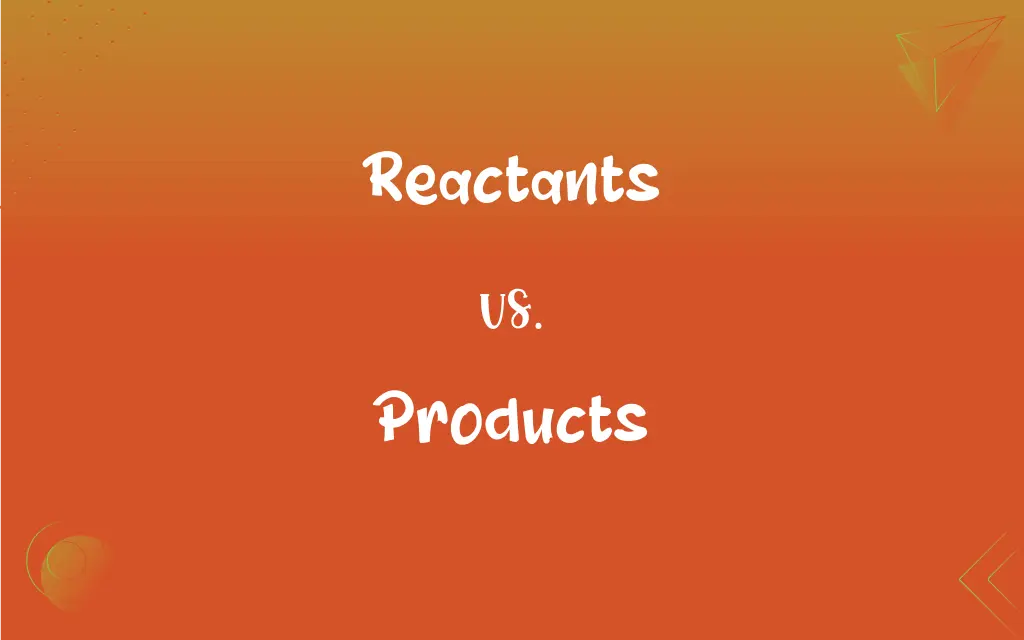Reactants vs. Products: What's the Difference?
Edited by Janet White || By Harlon Moss || Updated on October 19, 2023
Reactants are substances that start a chemical reaction, while products are the substances formed as a result.

Key Differences
In the realm of chemistry, reactants and products play pivotal roles. Reactants are the initial substances present before a chemical reaction occurs, while products emerge as the outcome of that reaction.
Chemical equations symbolically represent these changes, with reactants being positioned on the left side of the equation, while products are on the right. In this way, the equation indicates the transformation of reactants into products.
Reactants can be singular or multiple, depending on the complexity of the reaction. On the other hand, the outcome of the reaction, the products, might also be singular or multiple, showcasing the versatility and diversity of chemical reactions.
Chemical reactions vary, and while some might completely convert reactants into products, others might not. In such instances, some reactants remain even after the reaction, alongside the newly-formed products.
Understanding the distinction between reactants and products is fundamental in the study of chemistry. By grasping this, one can predict the outcomes of reactions and comprehend the changes happening at the molecular level.
ADVERTISEMENT
Comparison Chart
Definition
Substances present at the start of a chemical reaction.
Substances formed as a result of a chemical reaction.
Position in Equation
Left side
Right side
Role
Undergo transformation during reaction
Outcome of the transformation
State
Initial state before the reaction
Final state after the reaction
Usage in Chemistry
Studied to predict reaction pathways
Studied to determine reaction efficiency and outcome
ADVERTISEMENT
Reactants and Products Definitions
Reactants
Initial components in a chemical equation.
Hydrogen and oxygen are the reactants when forming water.
Products
Outcome entities in a chemical equation.
Salt and water are the products in the reaction of an acid with a base.
Reactants
Molecules that participate in the reaction.
In the combustion of methane, methane and oxygen serve as reactants.
Products
Molecules derived post-reaction.
Carbon dioxide is one of the products of cellular respiration.
Reactants
Substances that undergo change in a chemical reaction.
In photosynthesis, carbon dioxide and water are the reactants.
Products
Substances formed as a result of a chemical reaction.
Water is the product when hydrogen combusts in the presence of oxygen.
Reactants
Precursors to the formation of products.
In a synthesis reaction, the combining reactants yield a compound.
Products
Resultant compounds or elements following the change of reactants.
In the decomposition of water, hydrogen and oxygen gases are the products.
Reactants
Chemical species that donate or accept electrons, protons, or molecules to initiate reactions.
In acid-base reactions, the acid and base are the reactants.
Products
Chemical species formed by accepting or donating electrons, protons, or molecules during reactions.
In a neutralization reaction, salt and water emerge as products.
Reactants
A substance that is altered or incorporated into another substance in a chemical reaction, especially a directly reacting substance present at the initiation of the reaction.
Products
An item that is made or refined and marketed
Farm products.
Soaps, detergents, and similar products.
Travel products such as vacation trips.
Reactants
Plural of reactant
FAQs
Do reactants and products always appear in equal amounts?
No, the number of reactants and products can differ based on the stoichiometry of the reaction.
Can reactants be in different states of matter?
Yes, reactants can be solids, liquids, gases, or even aqueous solutions.
Can products be harmful?
Yes, depending on the reaction, products can be beneficial, inert, or harmful.
Are reactants and products only related to chemistry?
Primarily, yes. But similar concepts might appear in other contexts metaphorically.
How does one determine the rate of conversion from reactants to products?
Through the study of reaction kinetics, which examines the rate of reactions.
Can a single reactant yield multiple products?
Yes, some reactions with a single reactant can produce multiple products.
Are by-products the same as products?
Not necessarily. By-products are secondary products, while the main intended outcomes are called products.
Can we predict the products knowing only the reactants?
Often, yes, based on known chemical behavior and reaction types. However, reactions can be complex.
Are reactants always transformed fully into products?
No, in some reactions, not all reactants are completely converted to products.
Can energy be a product or reactant in a chemical reaction?
Energy isn't a "substance," but reactions can either absorb or release energy.
Are catalysts considered reactants or products?
Neither, catalysts speed up reactions but aren't consumed or produced by the reaction.
Can the identity of reactants determine the type of products?
Absolutely, the type and nature of reactants dictate the possible products.
What symbolizes the conversion of reactants to products?
An arrow, often used in chemical equations, indicates this transformation.
Can products act as reactants in another reaction?
Yes, products from one reaction can be reactants in a subsequent reaction.
Are reactants always on the left of a chemical equation?
In standard convention, yes, reactants are written on the left and products on the right.
Can products be reversible back to reactants?
In some reactions, yes. These are called reversible reactions.
Is the quantity of reactants always conserved in the products?
The mass is conserved, but individual reactants can be transformed into different products.
What determines the quantity of products formed in a reaction?
The amount of reactants and the reaction's efficiency or yield determine the product quantity.
Are there reactions where reactants and products coexist?
Yes, in equilibrium reactions, reactants and products can coexist in dynamic balance.
Is it true that reactants determine the feasibility of a chemical reaction?
Yes, reactants play a key role in determining whether a reaction will occur under certain conditions.
About Author
Written by
Harlon MossHarlon is a seasoned quality moderator and accomplished content writer for Difference Wiki. An alumnus of the prestigious University of California, he earned his degree in Computer Science. Leveraging his academic background, Harlon brings a meticulous and informed perspective to his work, ensuring content accuracy and excellence.
Edited by
Janet WhiteJanet White has been an esteemed writer and blogger for Difference Wiki. Holding a Master's degree in Science and Medical Journalism from the prestigious Boston University, she has consistently demonstrated her expertise and passion for her field. When she's not immersed in her work, Janet relishes her time exercising, delving into a good book, and cherishing moments with friends and family.
































































